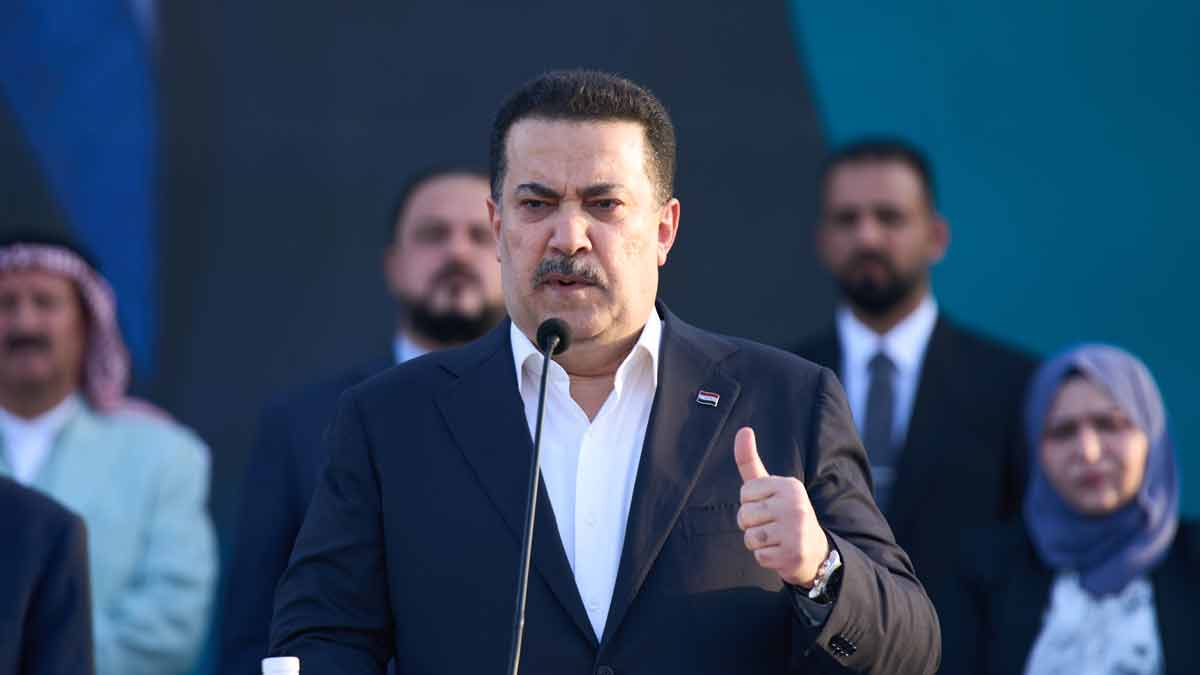Beyond the ballot: How money and militias shape Iraqi politics
 Iraqi Prime Minister Mohammed Shia al-Sudani speaks at his political block campaign rally before the parliamentary elections in Mosul | AP
Iraqi Prime Minister Mohammed Shia al-Sudani speaks at his political block campaign rally before the parliamentary elections in Mosul | AP
Two decades after the fall of Saddam Hussein, Iraq’s still-fragile political experiment stands at a critical juncture. The country is going to the polls on November 11, with a total of 7,768 candidates in the fray, including 2,248 women, for the 329 parliamentary seats. Yet there is growing public estrangement from formal politics. For most Iraqis, the ballot box no longer represents a mechanism of accountability but a ritual through which elites renegotiate their share of power. While the democratic institutions launched two decades ago remain intact, they have proved ineffective in fostering genuine political participation and healthy competition. There is widespread disillusionment regarding electoral politics.
Many Iraqis are likely to skip the polls, convinced that the process cannot alter their daily hardships. Turnout, which was nearly 80 per cent in December 2005, has steadily fallen as citizens see no improvement in public services or living standards. Iraq, despite its vast oil reserves, suffers from unreliable electricity and chronic unemployment. Against this background, elections have come to symbolise elite self-preservation rather than public renewal.
The upcoming vote is therefore less about popularity or performance and more about recalibrating power within the political establishment. Analysts describe it as an exercise in patronage and corruption rather than democratic competition. Former Prime Minister Haider al-Abadi remarked that the outcome will rest not on ideas but on money and influence, and observers have dubbed it the billionaires’ election. Money alone could be the single biggest deciding factor in the upcoming polls.
As a result of the widespread apathy towards the polls, political parties are turning to largely transactional measures and administrative processes to win votes. For instance, Prime Minister Mohammed Shia al-Sudani has created about a million government jobs during his term, largely aimed at consolidating support. Meanwhile, a black market for biometric voter cards has emerged, where votes can be effectively purchased for $100–$200. Payments are made either to ensure participation according to instruction or to buy abstention altogether. Parties also direct short-term service projects to neglected districts to cultivate loyalty.
Security-sector voting remains another tightly managed arena. Members of the armed forces, police, Popular Mobilisation Forces (a coalition of militias established to fight the Islamic State group, which operates with considerable autonomy) and Peshmerga cast their ballots early under the supervision of commanders who steer votes towards the political factions that oversee their units. The influence of social media has also grown sharply, with candidates paying influencers to promote their campaigns or disparage opponents, often at unprecedented rates.
There is also a further fragmentation of the ethnosectarian landscape compared with the past. As many as 31 alliances and 38 parties are in the fray, signifying not plurality and diversity, but the growing divisions among various ethnic groups. The ruling Shia Coordination Framework (SCF), a coalition of Shia factions, is expected to dominate and once again form a consensus government with major Kurdish and Sunni groups. Within the SCF, key players include Sudani’s Reconstruction and Development Coalition, Nouri al-Maliki’s State of Law, Qais al-Khazali’s al-Sadiqoun, and Hadi al-Ameri’s Badr Organisation, several of which maintain strong historical links with Iran. Parties aligned with militia networks such as Harakat Huqouq and the Sadiqoun Bloc are using their military and financial clout to secure seats.
The electoral field is notably altered by the absence of Muqtada al-Sadr and his movement, who are boycotting the vote. The Sadrists had won the largest share of seats in 2021 but withdrew after failing to form a national majority government in defiance of the power-sharing system known as Muhasasa. Al-Sadr has launched the Patriotic Shia Current, rebranding himself as a moral critic of the ruling order and preparing to return to politics should his rivals falter.
In Iraq, the elections only mean the beginning of a protracted process of bargaining. Iraq’s constitution establishes a 329-seat parliament where sectarian balance is maintained through informal conventions: the prime minister is Shia, the president Kurdish, and the parliamentary speaker Sunni Arab. In practice, no single list governs alone. The Federal Supreme Court’s interpretation that the largest bloc can be formed after voting entrenches coalition-making as the decisive phase of politics.
Since 2005, forming a government has taken on average 224 days. Seats are treated as bargaining chips exchanged for ministries and nearly a thousand senior posts known as special grades — positions that open access to patronage networks and state resources. Behind closed doors, negotiations are accompanied by the threat of street mobilisation or targeted violence, as witnessed when militia supporters and later Sadrists occupied Baghdad’s Green Zone after the 2021 vote.
The upcoming election is expected to reaffirm the dominance of the Shia Coordination Framework, though the eventual premiership will be decided only after drawn-out talks among elites.
Another challenge has been the growing incidents of political violence. On October 15, a car bomb killed Safaa al-Mashhadani, a Baghdad Provincial Council member and Sunni candidate running in the al-Tarmiya district north of the capital. Three days later, the office of another candidate, Muthanna al-Azzawi, was attacked by gunmen, injuring two bodyguards.
Meanwhile, political parties supported by Iran-backed militias are using their substantial military and financial power to assert influence. Among them are Kataeb Hezbollah’s political wing, the Harakat Huqouq (Rights Movement) bloc, and the Sadiqoun Bloc, led by Qais al-Khazali, the head of the Asaib Ahl al-Haq militia.
Another interesting development ahead of the election is President Donald Trump’s appointment of Mark Savaya, a loyal entrepreneur, as his special envoy to Iraq. It could mean that Washington is likely to exert pressure to exclude militias and their affiliated parties from sharing the spoils of power after the polls.
Middle East